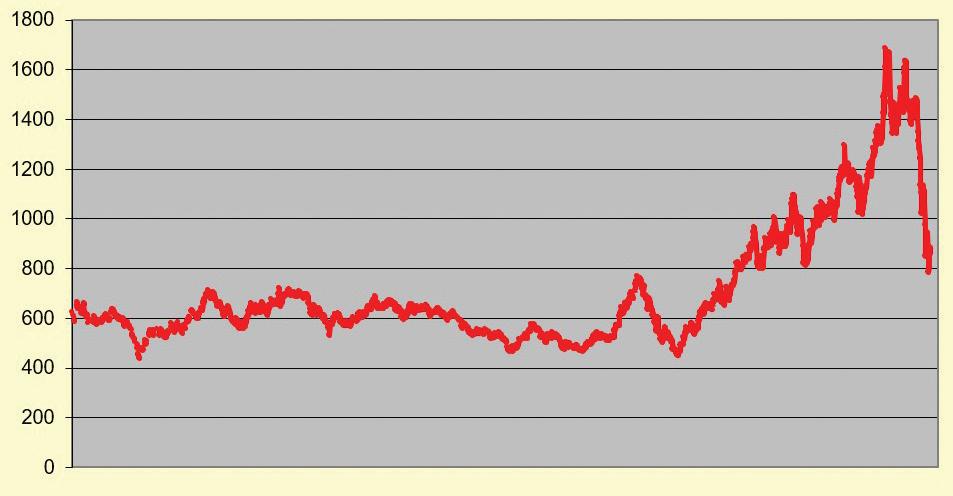
4 minute read
Pesticide shortage forces farmers to change plans
IN BRIEF
CANADA: BASF Canada is short on supplies of Liberty herbicide due to a lack of sufficient raw materials to make the weedkiller at its Regina plant in Saskatchewan, according to an 18 June tweet by Western Producer. Liberty 200 SN herbicide is suitable for use on canola, corn and soyabeans, the BASF website says. INDIA: The government has approved an additional 550,000 tonnes of imported soyabean meal, including genetically modified (GM) soya meal, to continue until 30 September, the Foreign Agricultural Service (FAS) of the United States Department of Agriculture (USDA) wrote on 23 May.
The move was made to alleviate high soya meal prices experienced by India’s poultry and livestock industry, in which meal was a critical feed input, the report said.
The 550,000 tonnes of imports was the remaining amount of a previous 1.25M tonnes quota announced last August that had been unused.
The imports are permissible through the eight ports: Nhava Sheva, Petrapole, Mumbai, Tuticorin, Vishakhapatnam, Ghojdanga, Kolkata, and the Ranaghat railway station.
Last year, the USDA said India imported approximately 650,000 tonnes of soyabean meal primarily from Argentina, Thailand and Vietnam.
Pesticide shortage forces farmers to change plans
Farmers in the USA are cutting back on their usage of common weedkillers, looking for substitutes for fungicides and changing their planting plans due to ongoing shortages of agricultural chemicals, Reuters reported on 27 June.
Reducing herbicide usage and turning to less-effective fungicides increased the risk of weeds and diseases, which could hit crop production, the report said.
Interviews with more than a dozen chemical dealers, manufacturers, farmers and weed specialists showed that shortages had disrupted US growers’ production strategies and raised their costs, Reuters wrote.
Shawn Inman, owner of distributor Spinner Ag Incorporated in Zionsville, Indiana, said supplies were at their tightest level in his 24-year career.
Shortages further reduced options for farmers battling weeds that had developed resistance to glyphosate after decades of overuse in the USA, the report said. Prices for glyphosate and glufosinate, another widely-used herbicide, had increased more than 50% compared with last year, according to dealers. These herbicides are commonly used with genetically modified seeds bred to be resistant to them.
Agrichemical companies said the agri-chemical shortages were due to the COVID-19 pandemic, transportation delays, a lack of workers and extreme weather. Meanwhile, the US Agriculture Department had launched an enquiry into competition in the sector, Reuters wrote.
UK proposes relaxing gene editing rules
The UK government has introduced a bill to pave the way for genetically edited plants and animals to be grown and raised for food in England, The BBC reported on 25 May.
Initially applicable only to plants, the proposed new legislation would relax regulations for gene-edited (GE), but not genetically modified (GM) products, the report said.
GE was currently not approved for use in England due to rules set by the European Union (EU) but Brexit had given the UK the ability to set its own rules, the BBC wrote.
Gene editing involves switching genes on and off in an organism by snipping out a small piece of DNA, compared with the GM process, which involves adding genes, sometimes from a different species.
The UK government believes GE will lead to crops that are resistant to pests and diseases and more resilient to the impact of climate change, according to the report.
However, the proposed legislation was criticised by some environmental campaigners and organic farming bodies, with non-profit campaign organisation GM Freeze director Liz O'Neill saying the new regulations would take away much needed scrutiny.
Calyxt says seedless hemp offered improved yields and quality
Supreme Court rejects Bayer's bid to dismiss Roundup cases
The US Supreme Court has rejected German chemical giant Bayer’s bid to dismiss claims that its Roundup weedkiller causes cancer, Reuters reported on 21 June.
The justices turned down the Bayer appeal and left in place a lower court decision that upheld US$25M in damages awarded to California resident Edwin Hardeman, a Roundup user who claimed his cancer had been caused by the company’s glyphosate-based weedkillers, the report said.
Bayer had said it should not be penalised for marketing a product deemed safe by the US Environmental Protection Agency (EPA) and on which the EPA would not allow a cancer warning to be printed.
A US jury has also found that Bayer’s Roundup weedkiller did not cause an Oregon’s man’s cancer – the company’s fourth consecutive trial victory over such claims, Reuters reported on 18 June.
Glyphosate is the active ingredient in Bayer brands such as Roundup and RangerPro and has been at the centre of mass litigation in the USA brought mostly by residential gardeners claiming the weedkiller caused their cancer.
Roundup is used by farmers in combination with the company’s genetically modified seeds.










